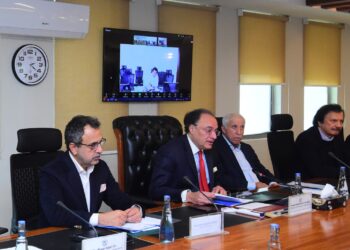ISLAMABAD: In a strategic move to strengthen bilateral economic ties, Pakistan has dispatched a high-level delegation to Saudi Arabia to negotiate a comprehensive economic roadmap expected to be finalized within the next two months, official sources confirmed.
The delegation is led by Commerce Minister Jam Kamal Khan and Minister for National Food Security and Research Rana Tanveer Hussain, accompanied by senior officials from the Special Investment Facilitation Council (SIFC) — the central body tasked with accelerating foreign investment into Pakistan.
According to sources familiar with the visit, the delegation’s mission is to lay the groundwork for a structured, long-term economic partnership with Saudi Arabia. “This isn’t just another diplomatic engagement — both sides are focused on building a clear framework before diving into specific projects,” one official said.
The Ministry of Commerce is actively developing an export plan tailored to Saudi market demands, while the delegation also aims to finalize terms for a number of high-profile investments, particularly in the energy, food security, and infrastructure sectors.
The visit comes ahead of an upcoming trip to Pakistan by Saudi Investment Minister Khalid al-Falih, who is scheduled to lead a 32-member delegation of top Saudi companies from October 9–11, 2024. At least six Saudi firms have already expressed strong interest in Pakistan’s energy sector, and an MoU is expected during that visit.
Prime Minister Shehbaz Sharif, who recently oversaw the signing of a historic defense pact with Saudi Arabia, has been participating in preparatory meetings for the economic talks via virtual sessions, signaling the importance Islamabad places on this economic engagement.
However, the delegation is also expected to address long-standing issues that have caused friction in the investment relationship — most notably the delays in resolving the dispute involving M/s Al-Jomaih’s investment in K-Electric, which Saudi authorities have flagged as a key concern. Pakistan’s Ambassador in Riyadh recently met with Saudi Assistant Investment Minister Ibrahim Al-Mubarak, who warned that further delays could undermine investor confidence.
Another critical agenda item is the finalization of a Bilateral Investment Treaty (BIT) framework. Both Saudi Arabia and Qatar have proposed changes to Pakistan’s 2021 BIT template, seeking enhanced investment protections and incentives. These differences have stalled several investment agreements and remain a key hurdle the delegation hopes to resolve.
Despite these challenges, officials remain optimistic that the current diplomatic momentum — combined with high-level political commitment — could lead to significant breakthroughs. “This delegation carries more than talking points; it carries mandates,” one senior official emphasized.
The visit marks a decisive moment in Pakistan’s effort to reposition itself as a serious destination for Gulf investment. Whether the delegation can turn this opportunity into concrete agreements will be closely watched — not just in Islamabad and Riyadh, but across the region.















